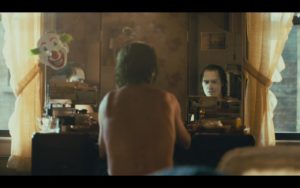It is, perhaps, a truism that every generation gets the Batman or Superman that they need/deserve. With Todd Philips’ JOKER, though, we get more than a cultural gloss of the zeitgeist. We get a funhouse mirror that lurks deep within a house of horrors that is an extrapolation of what happens when the 1% of the haves push the have-nots too far. This Joker (Joaquin Phoenix) is not the chaos of Heath Ledger, nor the camp of Jack Nicholson and Cesar Romero. No, this Joker is the not unreasonable reaction to helplessness in the face of a world gone mad. That’s what makes him so terrifying. At least to the 1%.

Joaquin Phoenix
In his pre-Joker incarnation, Joker is Arthur Fleck, a troubled, but essentially gentle spirit coping with urban decay in the 1980s. He’s the only child of a mother whose mind wanders, and he believes it is his purpose in life to bring joy to the world. Unfortunately, the world is not interested. In fact, it regards him in his clown frippery and make-up with disdain and condescension that can deliver a severe beating for doing nothing more than laughing. When funding cuts deprive him of his psychiatric social worker, when a co-worker’s putatively good intentions go wrong, and when his idol (Robert de Niro), a late-night talk show host finally takes notice of him only to mock him, Arthur spirals downward. When a secret his mother (Frances Conroy) has kept from him surfaces, he snaps.
Or maybe he already snapped, and we didn’t see it because it hadn’t registered with Arthur himself yet. Phillip’s script is told from Arthur’s POV, and is such an oneiric, immersive experience, where up is easily down, and Arthur becomes an object of empathy, even when behaving erratically. Even when becoming violent, so all-consumingly have we been swept up, that are we into his moral compass, a strict and honorable one, which he has created for himself. The shock and disgust are not ameliorated, nor is there the safety of knowing what Arthur’s strictly and honorable act or acts will be. The most disquieting thing about JOKER is, in fact, that endless interplay between understanding and disbelief at any given moment over any given act. It is grotesque and it is fascinating as it plays with Old Testament justice and sheer madness.

Phoenix
Phoenix is breathtaking. With a cackle of a laugh that Arthur bellows, he becomes the hollow man, wasted in mind and body, pretending to feel the joy that has eluded him, and a palpable desperation that it pretense will become reality, if he only laughs harder. It is heartbreaking. As is his equally palpable tenderness tempered with despair that renders him inert, through to the liberation of succumbing to insanity and the peace that it brings him, Phoenix is ferocious in his temerity, and fragile in his violence. It is a depiction of madness that is disturbing for the empowerment it brings, and the happiness it imparts to one who has so sorely desired, and deserved, it. He is the embodiment of the film’s world turned upside down, and it is a performance in which nothing has been left to chance. It is as nuanced as it is daring.
The politics of JOKER are stark, starting with the title character’s assertion that he doesn’t believe in anything. It is the cry of the downtrodden who have had their dreams beaten out of them, and what happens when they have nothing left to lose. Thomas Wayne (Brett Cullen), father of future Batman, Bruce and a heroic figure in other incarnations of the tales of Gotham, is here a rich man who views the underclass as clowns when they dare to protest their condition. Later, two cops are trailing Joker and lose him in a crowd of protesters dressed as clowns who were sparked to action by Joker’s killing of three wealthy men who terrorized of fellow subway riders as a joke. As a metaphor, it is sublime. As a comment on our time, it is prescient. As a warning, annotated as it is with a scene from Chaplin’s MODERN TIMES, it is the single scariest thing in JOKER.
For all its hints of Kafka, TAXI DRIVER, and PSYCHO, JOKER is piece The genuine smile smile Arthur beams as he watches the fiery riot he has inspired is heart-warming, cautionary, and deliberately disquieting.
Your Thoughts?